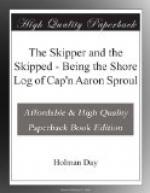But that seamanship was not sufficient to embolden him into an attempt to dodge a steamer with two masts and a dun funnel that came rolling out from behind Eggemoggin and bore toward him up the reach. He was too old a sailor not to know that she was the patrol cutter of the revenue service; wind and sea forced him to keep on across her bows.
She slowed her engines and swung to give him a lee. Cap’n Sproul swore under his breath, cursed aloud at his patient rowers, and told them to keep on. And when these astonishing tactics of a lonely dingy in a raging sea were observed from the bridge of the cutter, a red-nosed and profane man, who wore a faded blue cap with peak over one ear, gave orders to lower away a sponson boat, and came himself as coxswain, as though unwilling to defer the time of reckoning with such recalcitrants.
“What in billy-be-doosen and thunderation do you mean, you weevil-chawers, by not coming alongside when signalled—and us with a dozen wrecks to chase ’longshore?” he demanded, laying officious hand on the tossing gunwale of the dingy.
“We’re attendin’ strictly to our own business, and the United States Govvument better take pattern and go along and mind its own,” retorted Cap’n Sproul, with so little of the spirit of gratitude that a shipwrecked mariner ought to display that the cutter officer glared at him with deep suspicion.
“What were you mixed up in—mutiny or barratry?” he growled. “We’ll find out later. Get in here!”
“This suits me!” said Cap’n Sproul, stubbornly.
The next moment he and his Portuguese were yanked over the side of the boat into the life-craft—a dozen sturdy chaps assisting the transfer.
“Let the peapod go afloat,” directed the gruff officer. “It’s off the Polyhymnia—name on the stern-sheets—evidence enough—notice, men!”
“I’m not off the Polyhymnia,” protested Cap’n Sproul, indignantly. “I was goin’ along ‘tendin’ to my own business, and you can’t—”
“Business?” sneered the man of the faded blue cap. “I thought you were out for a pleasure sail! You shut up!” he snapped, checking further complaints from the Cap’n. “If you’ve got a story that will fit in with your crazy-man actions, then you can wait and tell it to the court. As for me, I believe you’re a gang of mutineers!” And after that bit of insolence the Cap’n was indignantly silent.
The cutter jingled her full-speed bell while the tackle was still lifting the sponson boat.
“They’re ugly, and are hiding something,” called the man of the faded cap, swinging up the bridge-ladder. “No good to pump more lies out of them. We’ll go where they came from, and we’ll get there before we can ask questions and get straight replies.”
Cap’n Sproul, left alone on the cutter’s deck, took out his big wallet, abstracted that fifteen-thousand-dollar check signed by Gideon Ward, and seemed about to fling it into the sea.




